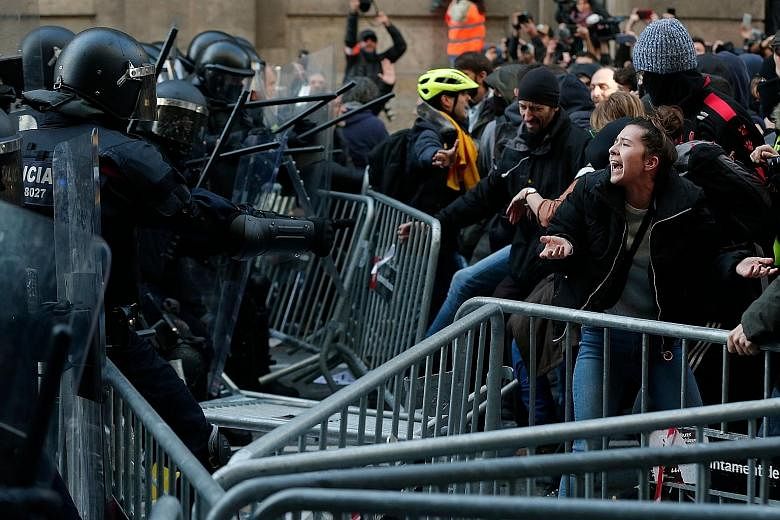BARCELONA • Catalan separatists blocked roads and rallied in their thousands yesterday as Spanish Prime Minister Pedro Sanchez brought a Cabinet meeting to regional capital Barcelona in both a show of central power and an attempt at negotiation.
Supporters of secession in the wealthy north-eastern region of 7.5 million people sat on highways from before dawn, setting up barricades of tyres and refuse.
Police dragged dozens away and arrested seven.
Mr Joan Toll, a 44-year-old chemist demonstrating with friends, said there was frustration at a lack of progress towards independence after a referendum and self-declaration last year.
"If you think about what has happened in the last year, we have achieved nothing. We are only being repressed more," he said. "No one wants to see violence but people are getting tired."
Socialist leader Sanchez's decision to convene his Cabinet in Barcelona for the first time since the crisis began underlined Madrid's opposition to full independence.
But it was also part of a strategy to secure the survival of his minority government with the aid of Catalonian pro-independence parties by offering them some more autonomy.
On Thursday, he met Catalonia's pro-independence regional government head Quim Torra. The pair agreed to a deeper dialogue despite their "notable differences".
Near the 14th-century building on Barcelona's historic seafront where the weekly Cabinet meeting was held, crowds thronged the streets waving red-and-yellow Catalan flags.
Some set off flares, and there were scuffles between police and masked youths.
The protests were patrolled by Catalonia's local police force, unlike last year's illegal referendum when national officers' use of batons and rubber bullets caused an outcry.
Mr Sanchez was set to decree a 22 per cent rise in the national minimum wage. The increase to €1,050 (S$1,650) a month will allow Spain to jump from having one of Europe's lowest minimum wages compared with average wage, to one of the highest.
It is one of the few policy levers his government has at its disposal, given its lack of a majority.
In a symbolic gesture, the government was also to approve the renaming of Barcelona airport, one of the busiest in Europe, after Josep Tarradellas - the first regional president of Catalonia when Spain entered democracy in the late 1970s.
The region unilaterally declared independence in October last year, triggering Spain's worst political crisis in decades and prompting the previous conservative central government to seize control there for several months.
Spain's Constitution prohibits regions from breaking away. The Socialists control fewer than a quarter of seats in the Madrid Parliament and need the support of smaller parties, including Catalan nationalists, to pass legislation.
REUTERS

